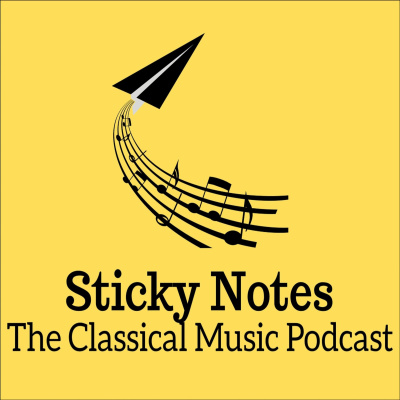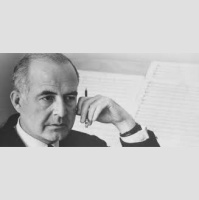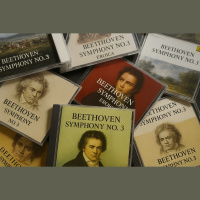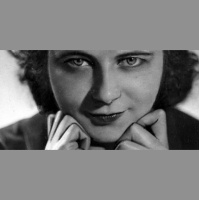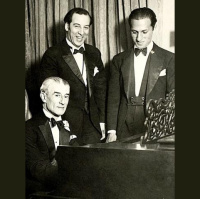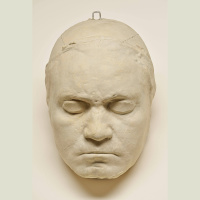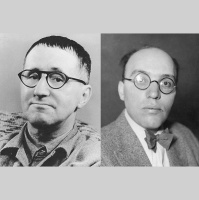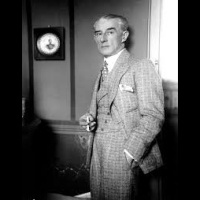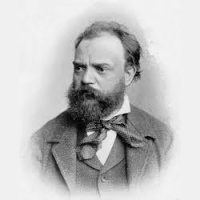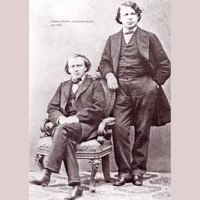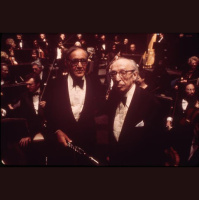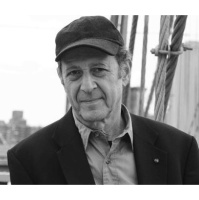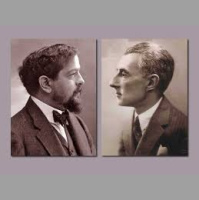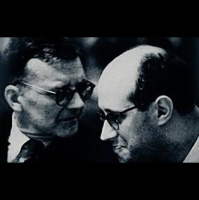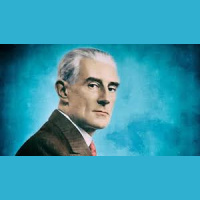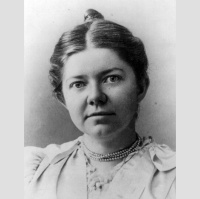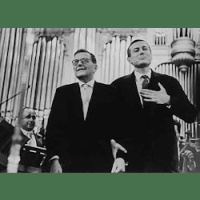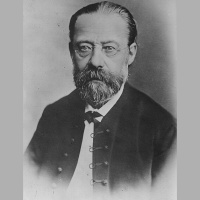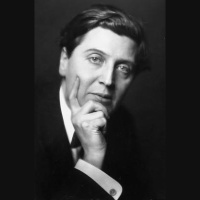Sinopsis
Sticky Notes is a classical music podcast for everyone. Whether you are a beginner just looking to get into classical music but don't know where to start, or a seasoned musician interested in the lives and ideas of your fellow artists, this podcast is for you. The show will feature interviews with the top artists of today, in-depth looks at specific pieces from the repertoire, and deep dives into each era of classical music, plus much more.
Episodios
-
Barber Violin Concerto
09/10/2025 Duración: 47minThere are so many great apocryphal stories in the long history of classical music, from the reason Tchaikovsky wrote his Sixth Symphony to what famous composers supposedly said on their deathbeds, to my favorite story: how Joseph Haydn’s Symphony No. 96, The Miracle, got its name. Apparently, during the premiere of the symphony, a chandelier fell, but miraculously didn’t hit anyone. Hence, The Miracle Symphony. The chandelier did, in fact, fall, but we now know it happened during the premiere of Haydn’s Symphony No. 102, which has no nickname. Coincidentally, or perhaps not so coincidentally, the 96th Symphony is performed far more often than the 102nd, likely because of its nickname, even though it’s the nickname of the wrong symphony. The Barber Violin Concerto has a great and true story behind it. But before certain information was revealed in 2010, the story everyone knew was quite different. The original version goes like this: Barber had completed the first two movements of his Violin Concerto and sent
-
100 Years of Beethoven's Eroica (recordings)
25/09/2025 Duración: 55minOne of my favorite things about having Patreon sponsors is that they often suggest the most fascinating pieces and topics for shows. Adrian, who sponsored a show last year, gave me one of my favorite prompts when he suggested looking at works based on literature. Now he’s sponsored another episode, this time with an equally compelling idea that I was eager to explore right away. His prompt was: “The evolution of conducting techniques throughout recorded history. How have innovations from great conductors changed how music is performed and understood?” As a conductor, the thought of diving into different recordings of a single piece naturally whets my appetite. But the real reason I was so excited about this episode is that interpretation is, in my view, wildly misunderstood. I’ve tried to tackle this idea in many different ways, in my episode about the sound of the violin with Soovin Kim and my dad, Donald Weilerstein; in my “What Does Music Mean?” episode; and even in “What Does a Conductor Really Do?” But I
-
The Life and Music of Grazyna Bacewicz
06/09/2025 Duración: 57minThe great Polish composer Witold Lutoslawski said this after the premature death of his contemporary Grazyna Bacewicz: “She was born with an incredible wealth of musical talent, which she succeeded to bring to full flourish through an almost fanatical zeal and unwavering faith in her mission. The intensity of her activities was so great that she managed, in a cruelly-shortened life, to give birth to such treasures that any composer of her stature with a considerably longer life span could only envy.” Bacewicz is a name that is probably not that familiar to you, but during her lifetime she was an extremely popular composer in her native Poland and across Europe as well. In the United States, her music has been rarely performed, though this has started to shift thanks to a renewed interest in female composers of the past. This new look at Bacewicz has revealed an incredible wealth of music. Bacewicz was one of the most prolific composers of the 20th century, writing over 200 works during her short lifetime! Som
-
Sticky Notes meets You'll Hear It
22/08/2025 Duración: 01h10minI had such a wonderful time joining the jazz podcast You'll Hear It! We talked about the meeting of jazz and classical music, a topic I've explored before, but never in this much depth and never with so much input from jazz musicians and experts like Peter Martin and Adam Maness. We talk about great jazz and classical composers, but we also talk about the strange divide between jazz musicians and classical musicians, trying to break down the barriers that exist between purveyors of these wonderful genres of music. I hope you enjoyed this one as much as I did!
-
Impressions in Blue: Ravel & Gershwin
07/08/2025 Duración: 44minIn the mid-1920s, Maurice Ravel wrote a letter to the legendary composition teacher Nadia Boulanger. Boulanger’s class was a mecca for composers, both young and old, and musicians from all over the world vied to study with her. But Ravel’s letter wasn’t on his own behalf. Instead, he urged Boulanger to take on a young student whom Ravel himself had declined to teach. He wrote: "There is a musician here endowed with the most brilliant, most enchanting, and perhaps the most profound talent: George Gershwin. His worldwide success no longer satisfies him, for he is aiming higher. He knows that he lacks the technical means to achieve his goal. In teaching him those means, one might ruin his talent. Would you have the courage, which I wouldn’t dare have, to undertake this awesome responsibility?" Boulanger also declined to take Gershwin as a student, fearing, like Ravel, that she might damage his spontaneity and dynamic jazz sensibility. Whether or not the famous story is true (that Ravel turned down Gershwin’s req
-
Beethoven Piano Sonata in B Flat Major, Op. 106, "Hammerklavier" - Part 2
24/07/2025 Duración: 53minThere is a special category when it comes to Beethoven; a catalogue that doesn’t include complete symphonies, sonatas, concerti, string quartets, etc., but just single movements. This is the catalogue of great Beethoven slow movements. Beethoven’s slow movements are like a great Tolstoy novel. They span the gamut of human experience and also reach beyond it, into something we cannot understand but all somehow perceive. Simply put, Beethoven often seems to know us better than we know ourselves. This brings me to the slow movement of Beethoven’s Hammerklavier Sonata. Unlike those late quartet slow movements, the slow movement of the Hammerklavier is not about ecstatic contemplation. Instead, it is a movement of pure and profound despair. It has been described as “a mausoleum of the collective suffering of the world,” and “the apotheosis of pain, of that deep sorrow for which there is no remedy, and which finds expression not in passionate outpourings, but in the immeasurable stillness of utter woe.” This is not
-
Beethoven Piano Sonata in B♭ major, Op. 106, "Hammerklavier" - Part 1
10/07/2025 Duración: 44minBeethoven once wrote to his publisher: “What is difficult, is also beautiful, good, great, and so forth. Hence everyone will realize that this is the most lavish praise that can be bestowed, since what is difficult makes one sweat.” If this credo manifests itself most powerfully in any one of Beethoven’s works, it might be the piece we’ll talk about today, the piano Sonata Op. 106, nicknamed, “Hammerklavier.” It is the longest Sonata Beethoven ever wrote, which essentially means that it was the longest sonata anyone had written up to that point. It marks one of the pivot points between Beethoven’s so-called heroic period and his late period, where his music became even more cosmically beautiful than before. It is certainly his most ambitious Sonata to that point, and his most difficult. The scale of the Hammerklavier sonata is hard to describe; in around 45 minutes of music, Beethoven explores the full gamut of human emotion. The intensity, the difficulty, and the concentration that this sonata requires from
-
Weill: The Seven Deadly Sins
26/06/2025 Duración: 01h01sThe collaboration between Kurt Weill and Bertolt Brecht is rightly legendary. The two men could not have been more different from each other, and like the Brahms/Joachim relationship I mentioned in my recent show about the Brahms Double concerto, the friendship between Weill and Brecht was stormy to say the least. The two collaborated on some of the most memorable works of the Weimar era in Germany, such as the Threepenny Opera, which features a pretty famous tune called Mack the Knife. Their final collaboration was on the “sung ballet” The Seven Deadly Sins. This is a piece that was written at a point of remarkably high tension within Weimar Germany. On an artistic level, the 1920s and early 1930s had seen a veritable explosion in the world of culture, with art, dance, theater, and music all featuring artists who were pushing the boundaries with wild experimentation and a kind of ecstatic fervor that produced some of the world’s greatest and most memorable cultural achievements. On a parallel track however,
-
The Ravel Sound with Norbert Müllemann and Stefan Knüpfer
12/06/2025 Duración: 45minI so enjoyed making this latest episode in my collaboration with G Henle Publishers. I talked with two absolute experts in their fields, Norbert Mülleman and Stefan Knüpfer, all about how to edit Ravel's music, and how to create the Ravel sound on the piano. This episode definitely veers into some very nerdy territory, but Norbert and Stefan are both so brilliant at explaining very high level concepts in a way that anyone can understand, from a person who has never looked at a score to a professional performer. I think everyone will learn a lot from this episode and I don't think you'll ever hear Ravel the same way again after listening! Enjoy!
-
Dvorak Violin Concerto
29/05/2025 Duración: 49minAdmit it: if you're a fan of classical music—or even just a regular concertgoer—you might have glanced at the title of this episode and done a double take. The Dvořák Violin Concerto? Not the Cello Concerto? One of the things I love about my job as a conductor—and my side gig as a podcast host—is bringing audiences and listeners like you pieces you may never have heard before, even if they're by extremely well-known composers. Don’t get me wrong, I love the blockbusters. But there’s a special thrill in introducing someone to something new. Now, some of you might already be big fans of the Dvořák Violin Concerto. But in my experience, it’s relatively unknown compared to Dvořák’s more famous works. I’ve never performed it myself, and I’ve only heard it live once. It’s not part of most touring soloists’ repertoire, and it’s just one of those pieces that rarely comes up—especially compared to the Cello Concerto, which I think I’ve conducted at least once every season since becoming a conductor. This concerto came
-
Brahms Double Concerto
15/05/2025 Duración: 58minIt’s entirely possible that we would not know the name of Johannes Brahms very well if Brahms hadn’t met Joseph Joachim as a very young man. Joachim, who was one of the greatest violinists of all time, had already established himself as touring soloist and recitalist, and he happened to know the musical power couple of Robert and Clara Schumann quite well. Joachim encouraged Brahms to go to Dusseldorf to meet the Schumann’s, and the rest is history. I’ve talked about the Brahms-Schumann relationship dozens of times on the show before, but to keep it very brief, Robert Schumann’s rhapsodic article Neue Bahnen(new paths) launched Brahms’ career, and until Schumann’s deterioration from mental illness he acted as a valued friend and mentor for Brahms. Clara Schumann, as a performer, was a powerful advocate for Brahms’ music as well as a devoted and loving friend throughout the rest of their lives. Almost constantly present in this relationship was the sound of Joseph Joachim’s violin. Brahms did not have a huge c
-
Copland Clarinet Concerto
01/05/2025 Duración: 48minThe commission for a new Clarinet Concerto from the great American composer Aaron Copland came from a rather unlikely source: Benny Goodman, the man known as the King of Swing. Goodman was one of the most famous and important jazz musicians of all time, but in the late 1940s, swing music was on the decline, and bebop had taken over. Goodman experimented with bebop for a time but never fully took to it in the way that he had so mastered swing. Goodman then turned towards the classical repertoire, commissioning music from many of the great composers of the time, such as Bela Bartok, Darius Milhaud, Paul Hindemith, Francis Poulenc, and of course, Aaron Copland. Copland eagerly agreed to the commission, and spent the next year carefully crafting the concerto, which is full of influences from Jazz as well as from Latin American music, perhaps inspired by the four months Copland spent in Latin America while writing the piece. What resulted from all this was a short and compact piece in one continuous movement split
-
Steve Reich: Different Trains
17/04/2025 Duración: 52minSteve Reich, the great American contemporary composer, provided this program note about his work Different Trains: “The idea for the piece came from my childhood. When I was one year old my parents separated. My singer, song-writer mother moved to Los Angeles and my attorney father stayed in New York. Since they arranged divided custody, I travelled back and forth by train frequently between New York and Los Angeles from 1939 to 1942 accompanied by my governess. While the trips were exciting and romantic at the time I now look back and think that, if I had been in Europe during this period, as a Jew I would have had to ride very different trains. With this in mind I wanted to make a piece that would accurately reflect the whole situation.” Reich went about this piece in a completely innovative way: he recorded voices and then created the musical material for the piece out of the voices themselves, something that had never been done before. Therefore, the text and music material were integrated in a groundbrea
-
Best of Frenemies: Debussy and Ravel
03/04/2025 Duración: 52minDebussy and Ravel are often described as the prototypical musical impressionists. It is often said that the two composers are the closest equivalents to the artistic world of Monet, Renoir, Pisarro, Degas, and others. But both Ravel and Debussy (like Monet for that matter), vehemently rejected the term Impressionism, and they both felt that they were striking out on their own individual paths in their msuic. That didn’t stop the public and critics from constantly comparing the music of these two shining lights of French music, despite the fact that Ravel and Debussy are actually quite different. Comparing Ravel and Debussy is a bit like comparing Haydn and Mozart. At first glance, there are many similarities, but if you look and listen more closely, Ravel and Debussy(like Mozart and Haydn) had totally different approaches, goals, and styles. All of the constant comparisons and attempts at making the composers compete with each other had a real impact on Debussy and Ravel. Initially they were friends and mutua
-
Shostakovich Cello Concerto No. 1
20/03/2025 Duración: 50minIt’s hard to overstate the depth of the connection between Dmitri Shostakovich and the legendary cellist Mstistlav Rostropovich. Shostakovich and Rostropovich were extremely close friends, and Shostakovich wrote and dedicated several works to him, including the piece we’re going to talk about today, the first Cello Concerto. Rostropovich had been desperate to get Shostakovich to write a concerto for him, but Shostakovich’s wife had one simple piece of advice: if you want Shostakovich to write something for you, don’t talk to him about it or even mention it. So Rostropovich waited and waited, until July of 1959, when he was asked by Shostakovich to come to Leningrad to try out a new Cello Concerto. Shostakovich played through the piece for Rostropovich, turned to him, and asked him if he liked it. Rostropovich apparently told Shostakovich that he “had been shaken to the core.” Shostakovich, in his famously modest way, then shakily asked Rostropovich if he could dedicate the concerto to him. Rostropovich immedi
-
Ravel, Ravel, Ravel, w/Boris Giltburg and G. Henle Verlag!
06/03/2025 Duración: 59minMagician, Swiss Watchmaker, Aloof, Elegant, Precise, Soulful, Childlike, Naive, Warm: these are all words that have been used to describe Maurice Ravel, a man of elegant contradictions. But perhaps these contradictions are why his music remains so beloved and universally appealing to so many musicians and audience members. Ravel has long been one of my favorite composers, and I always adore listening to his music and performing it. For the 150th anniversary of his birth, the legendary publishing house of G Henle has decided to focus on Ravel and his circle this year, calling this series Ravel and Friends. A few months ago, the Henle office contacted me to ask if I would be willing to collaborate with them on a series of Sticky Notes episodes about Ravel, each one focusing on the relationship between Ravel and another composer who was in his circle. This sounded like an amazing idea, and so I jumped at the chance to work with them. So, over the course of the next 5-6 months, you will be seeing 5 episodes under
-
Amy Beach, "Gaelic" Symphony
06/03/2025 Duración: 01h56sAmy Beach is a name that might not be familiar to you. She was born in 1867 and died in 1944, and her life was one of the most fascinating and varied in musical history. She was a child prodigy, became a successful pianist, and then pivoted to composing at her husband’s request. She was one of the first successful composers without any training from Europeans, and when her Gaelic Symphony was performed for the first time in 1896, it became the first symphony by an American woman to be published or performed. This symphony, and Beach’s whole career, is inextricably linked with the history and mores of the time, from the influence of Dvorak on American music, to Beach’s stop and start relationship to performing. The Gaelic symphony is a remarkable amalgamation of American symphonic brilliance, some European influence(especially from Dvorak), and the music of Beach’s own heritage. It’s a symphony that was very popular in its time and then was forgotten, but now is finding itself on the stage more and more often.
-
Sticky Notes en Français! Shostakovich Symphonie No. 13 (Bonus Episode)
27/02/2025 Duración: 01h10minVoici un épisode bonus spécial de Sticky Notes en français, en avant-première de mes concerts avec l'Orchestre National de Lille, présentant la 13e symphonie de Shostakovich. Si vous souhaitez écouter la version anglaise de cet épisode, elle est disponible dans les archives. Je m'excuse pour toute mauvaise prononciation en cours de route, et j'espère que vous l'apprécierez ! This is a special bonus episode of Sticky Notes in French ahead of my concerts with the Orchestre National de Lille, featuring Shostakovich's 13th symphony. If you would like to listen to the English version of this episode, it is available in the archives. Apologies for any mis-prononciations along the way, and I hope that you enjoy it!
-
Smetana: Ma Vlast
06/02/2025 Duración: 01h05minNationalism, patriotism, cultural identity, a sense of home; these are concepts and ideas whose popularity have ebbed and flowed throughout history. Nationalism has been seen as a natural expression of cultural identity and pride, and it also has been at the core of virulent racism and xenophobia. Patriotism has been used as a cudgel by all sides of the political spectrum for good and evil, and a sense of home has led to cultural explosions and also to some of the bloodiest wars of all time. For Bedrich Smetana, these concepts were extremely multi-layered. He was a proud Bohemian nationalist for much of his life, but he also barely spoke Czech(German was the lingua franca among educated classes in Prague), and he was also disenchanted with the Prague musical establishment due to their cool reception of his Wagnerian/Lisztian style. He even left Prague for a time to work in Gothenburg Sweden, writing curtly to his parents: “Prague did not wish to acknowledge me, so I left it.” But only 6 years later, he wrote
-
Berg Violin Concerto
23/01/2025 Duración: 48minIn the early 1930s, at the height of the atonal and twelve tone movement in music, the American violinist Louis Krasner commissioned a concerto from the Viennese Composer Alban Berg. Berg declined at first, saying that his idiom was not appropriate to a concerto and that he did not belong in the world of Wienawski and Vieuxtemps, two relatively obscure composers nowadays who wrote virtuoso showpieces for the violin that are very exciting but not particularly deep on a musical level. Krasner countered with the Beethoven and Brahms’ violin concertos, which, frankly, is a pretty great argument! Krasner was convinced that Berg was the vessel through which 12 tone/serial music could reach, as the great writer Michael Sternberg called it, “it’s expressive potential.” The 12 tone/serial technique of writing music was still controversial at the time(and it remains that way now), with many composers and performers embracing atonal music, with others, especially audiences, turning away. Berg finally accepted the commis
